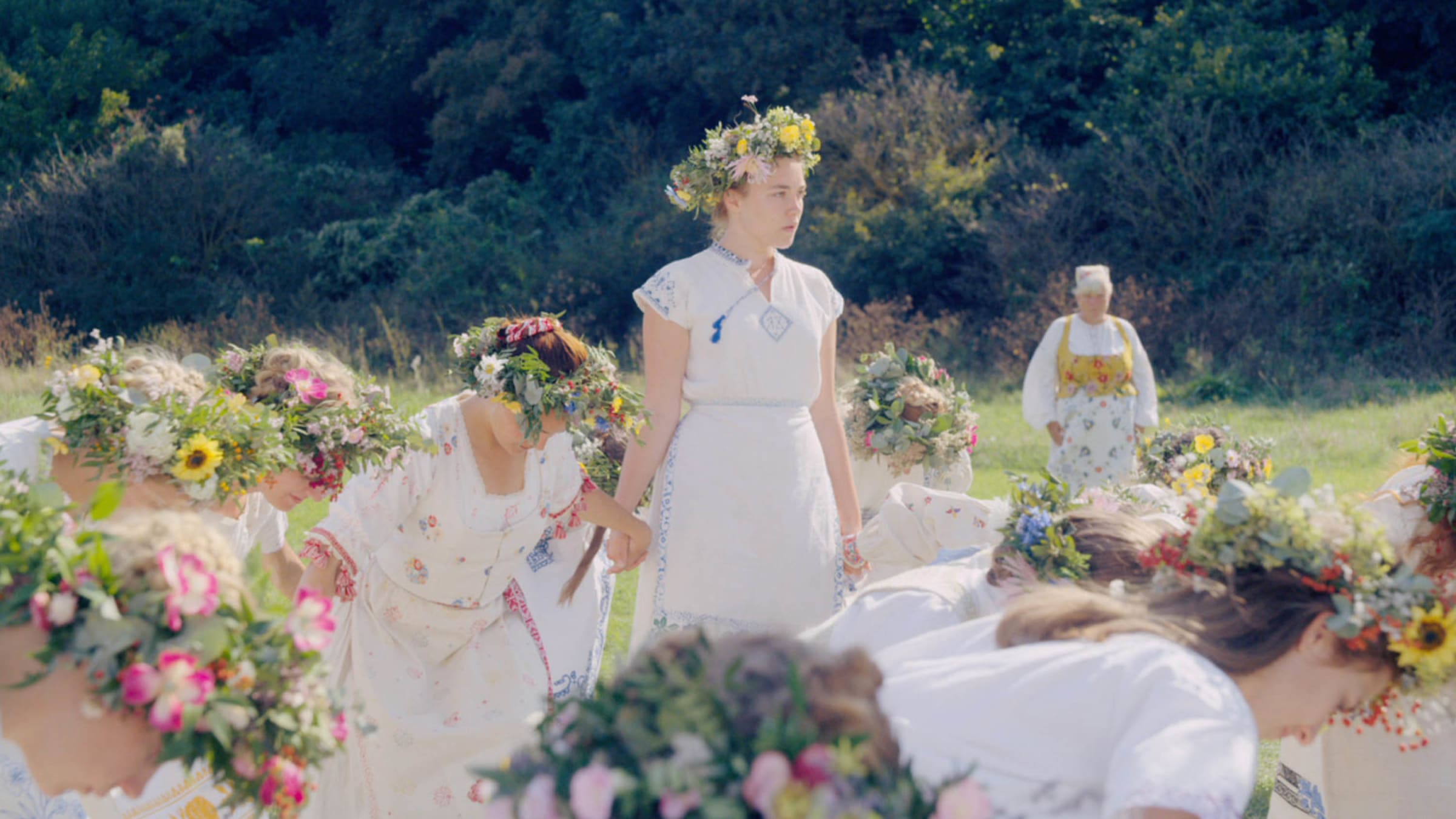Midsommar (2019).
Dani Ardor emotes physically, viscerally, and she loses control when circumstances overwhelm her. Upon learning of a terrible tragedy, she weeps loudly, uncontrollably, in the lap of her boyfriend – a man whose indifference is a far cry from what Dani – or anybody – needs from a life partner. She suffers panic attacks at various stages, and for good reason. There are similarities between her outbursts of anguish and the kinship that exists within the Swedish commune she’s reluctantly invited along to, where shared emotional experiences are celebrated as full-bodied expression.
Ari Aster’s follow-up to Hereditary is a less haunting affair, but Midsommar digs its claws into your psyche while exploring all of the big topics on a broader spectrum; life and death, love and sex. The simmering tension is occasionally punctuated by moments of abrupt horror, but much of it subsides for a final act that unravels itself with an aura of inevitability and closes with a hypnotising purification. It follows a group of grad students brought by one of its members to experience a traditional, ancestral festival celebrated every ninety years within his native community.
/cdn.vox-cdn.com/uploads/chorus_image/image/64042782/midsommar4.0.jpg)
Gentle scepticism from the members of the group (namely Mark, played with impeccable comedic timing by Will Poulter) are where Aster’s script finds most of its levity, though a lot of it can also be attested to the baffled and bewildered expressions that the bizarre events force upon the faces of the outsiders. The members of the commune behave with a level of extremity that, at least early on in the film, settle the nerves just as easily as when we get to, on the very rare occasion, see Florence Pugh’s Dani have a moment of genuine joy. The latter is a testament to both Pugh and the character herself while the former takes a dramatic shift from humorous to horrifying.
As polite and as welcoming as these cultists are, their exterior ceases to comfort us once they start to partake in deeply unsettling activities. At best we can nervously laugh through the ominous proceedings. Despite how obviously the leaders of the commune are puppeteers pulling the strings on the “newcomers” with the intent to do with them as they please, their motives are uniquely sincere and their methods unpredictable. There’s an entire mythology to be explored here, and we’re given fascinating glimpses into an old and powerful traditional heritage that treats its deadly practices as cause for celebration and even envy among those that are left out.
The drama within the central group is purposefully menial, as though they’re failing to see the blood on the rocks while the rifts start to form. Dani is most aware and most disturbed by it all, something attributed to her still recovering from her recent tragedy. As much as this is a well-concealed breakup movie, it’s also a dark fable on rebirth. Fire features frequently as a purifying essence, and when Dani is dressed in flowers she becomes a goddess. Midsommar feels like theater, a tale as old as time but told through contemporary eyes. The visuals are at times distorted, the images flipped on their head. We enter a new world as the group ventures deeper into the endless daylight of the open land. The film transitions starkly from a cold blue America, warping reality when it shifts to the blue skies of a whole other world.

Much like with Hereditary, Aster is interested in big ideas and the kind of ambition that can threaten to get in the way. Hidden secrets lie within Midsommar‘s frames, but even on the outside it’s a (rather distressing) meditation on life itself, the value placed on the relationships we forge, and the ability to become the masters of our own fate in the light of something greater than us. Characters come to embrace or fear these ideas and, though they are observed to an extreme, the beliefs held within the commune serve to break down the very values that the protagonists hold dear to them. Sex is only a necessity, celebrated but not glorified, while grief is not without merit but an ultimately pointless exercise if labored over for too long. Those we love should feel like home, but Christian (Jack Reynor) is anything but that to Dani. Like any worthy goddess, Dani is expected to make sacrifices. A spectator for most of the film, there’s triumph in her moments of genuine control.
Fits of deep, haunting emotion plague the unsuspecting visitors. This foundation is built in the very beginning when Dani’s much belittled concerns for her family prove genuine. Apart from a number of hilarious scenes that elevate the group dynamic through its opening act, the film’s unsettling nature remains a constant even through its less frantic, rather stilted moments. And yes, while these are arguably mundane moments that are as menial to watch as they are to engage with, they work in service of burying us deep into this bizarre, alien terrain. Pacing issues only crop up near the end of the second act, and the film certainly doesn’t deteriorate as a result.

Midsommar acts as a personal exploration of the turmoil of an unsatisfying cohabitation. Its secondary themes of life, death, and everything in between are supported by often unexpected beauty and sudden, crafty bursts of horror. Just as its most shocking moments are elevated by our sharing in Dani’s own futility, we are able to revel in her rare victories just as equally. Because of all of that, Midsommar closes its own circle. Breakups are hard. Relationships can be harder. Sometimes things need to get a little crazy for us to finally find clarity.
Film ’89 Verdict – 8/10
Midsommar is on general theatrical release in the US & U.K. now.

